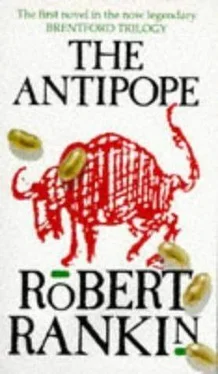Robert Rankin - The Antipope
Здесь есть возможность читать онлайн «Robert Rankin - The Antipope» весь текст электронной книги совершенно бесплатно (целиком полную версию без сокращений). В некоторых случаях можно слушать аудио, скачать через торрент в формате fb2 и присутствует краткое содержание. Жанр: Современная проза, на английском языке. Описание произведения, (предисловие) а так же отзывы посетителей доступны на портале библиотеки ЛибКат.
- Название:The Antipope
- Автор:
- Жанр:
- Год:неизвестен
- ISBN:нет данных
- Рейтинг книги:4 / 5. Голосов: 1
-
Избранное:Добавить в избранное
- Отзывы:
-
Ваша оценка:
- 80
- 1
- 2
- 3
- 4
- 5
The Antipope: краткое содержание, описание и аннотация
Предлагаем к чтению аннотацию, описание, краткое содержание или предисловие (зависит от того, что написал сам автор книги «The Antipope»). Если вы не нашли необходимую информацию о книге — напишите в комментариях, мы постараемся отыскать её.
The Antipope — читать онлайн бесплатно полную книгу (весь текст) целиком
Ниже представлен текст книги, разбитый по страницам. Система сохранения места последней прочитанной страницы, позволяет с удобством читать онлайн бесплатно книгу «The Antipope», без необходимости каждый раз заново искать на чём Вы остановились. Поставьте закладку, и сможете в любой момент перейти на страницу, на которой закончили чтение.
Интервал:
Закладка:
There was already a considerable number of people assembled within the Mission, and the three would-be party-poopers could see little above the multitude of heads.
Omally felt the Professor’s sinewy hand closing about his arm as the old man drew the Irishman away towards a shadowy corner. Pooley followed them. Here and there he saw a face he recognized, but doll-like, vacant of expression and seeming to lack some essential ingredient of humanity.
The three men squeezed themselves into a darkened niche at the rear of a large column. The Professor pressed a slender finger to his lips. “Watch and wait,” he counselled.
Pooley bobbed up and down in the hope of observing what was going on. Tiring of this futile occupation he whispered to Omally, “Give us a shin up this pillar and I’ll have a look around.” Amid a fair amount of puffing and cursing, all performed in muted tones, Pooley was borne aloft.
What he saw sent his brain reeling at the fantastic transformation which had been wrought within the ivy-hung walls of Brentford’s Seamen’s Mission. The entire building had been gutted, partition walls, doors, the upper floor, all were gone. Pooley found himself staring into what must surely be a cathedral. Rows of elaborately carved doric columns soared upwards towards the roof which, once the haunt of nesting wasps and sleeping bats, was now a glistening dome painted and frescoed in the style of Michaelangelo, depicting mighty biblical scenes.
There was Adam, wide-eyed and innocent, staring into the godly face of his bearded creator. Eve’s temptation, with the hideous black serpent entwined about the tree of knowledge. The flood, ferociously portrayed with roaring skies and smashing waters, Noah’s ark pitching and the Man of God raising his hands towards Heaven. There was the fall of the Tower of Babel, the destruction of Sodom and Gomorrah and countless other scenes depicted so cunningly that the eye might wander for ever amongst them.
The great hall was lit by rows of tall wrought-iron torchères of ponderous proportions, and their steady light illuminated the astonishing adornments which lined the walls: the gilded icons and embossed tableaux, the bronze statues of the saints, the silver madonnas, and the rows of heraldic crests, each of which bore the emblazoned figure of a great bull. There was a king’s ransom here, that of many kings in fact, in this unlikely setting.
And then Pooley’s eyes fell upon the altar. He had seen pictures in library books of the altarpieces of the world’s most notable cathedrals, but they paled into insignificance before this. It was magnificence beyond magnificence, opulence and grandeur taken to a point where it surpassed all beauty and became a thing to fear.
A profusion of fatly bummed cherubim fluttering and fussing in their golden nakedness; row upon row upon row of candles blazing amid the rising gem-covered columns; the traceried woodwork and carved adornments; the proliferation of wondrous beings, half human half animal, set in attitudes of supplication, gazing ever upwards towards the titanic figure which crested the altarpiece and held in his outstretched arms a hanging tapestry woven in cloth of gold and depicting once again the motif of a great black bull. The banner of the bull. The banner of the Borgias.
Pooley could have spent long hours in reverent contemplation of these wonders had not Omally chosen this particular moment to topple backwards into the darkness, bringing Jim down from his perch and tumbling him to the floor.
“Sorry,” said John. “Anything to see?”
Pooley shook his befuddled cranium, unable to find words to describe what he had seen. “You have a look,” he said finally. “I’ll give you a leg up.”
Omally’s head rose unsteadily above the crowd, which still flowed unabated through the Mission door. He saw what Pooley had seen. Certainly the glories were undeniable in their magnificence, but there was something more. Omally cocked his head upon one side. The geometry of the entire hall was slightly amiss; it was not immediately noticeable, but the more he looked at it then the more obvious it became.
He squinted up at the great pillars supporting the marvellous domed ceiling. Surely they were slightly out of true? Several seemed more closely spaced than the others and the one at the end was not quite perpendicular. And the dome itself, it was not absolutely round, more ovoid, or more accurately it was egg-shaped.
The great golden altar, for all its unworldly spectacle, was definitely crooked, top heavy. The statuary was similarly lopsided, some leaning at dangerous angles. The icons seemed to have been nailed into place and the raised dais which filled an enclosed space before the altar was far from level.
Some attempts had obviously been made here to correct the deficiency and Omally noted that a number of red flettons had been wedged under one corner of it. Red flettons! Omally stifled a great guffaw. So that was it! Old Pope Alex was certainly far from omnipotent if he dwelt under the misconception that present day jobbing builders could repeat the masterworks wrought by their fifteenth-century counterparts. The thought that the crimson giant at the Mission was actually capable of error set Omally in fine spirits. These fine spirits, however, were soon dispelled by what next occurred.
The door of the Seamen’s Mission swung shut with a death cell finality and a cry rose up from the throats of the assembled multitude. It was not so much a cry as a howl. Omally hastily returned to floor level and endeavoured to lose himself once and for all amongst the shadows. The howl went up from all corners of the room, animal in nature, atavistic, echoing down centuries, primeval and cruel.
The howl rose up, filling the great hall, reverberating about the dome and rebounding from the pillars. It rose and rose in pitch, forming into a scream. The hierophants threw back their heads; hands crossed on their chests like a thousand dead Pharaohs, they swayed upon their heels and howled. Pooley tightened the grip upon his ears, Omally rolled his eyes, and the Professor gripped the silver cross he wore about his neck and mumbled his phrases of Latin. All at once the howl changed, dropped down in tone and formed itself into a low chant.
The Professor pricked up his ears. “It is a mantra,” he said, although none heard him.
Slowly the syllables formed upon one another, the chant went up time after time, driving itself almost physically at the three men crouched in the darkness behind the column. Omally was staring goggle-eyed and the Professor forced the Irishman’s hands up over his ears. “You must not hear this,” he whispered. “You must not hear.”
Omally hummed to himself one of his favourite Republican songs, the much-loved standard, “Kevin Barry”. He was halfway through the now legendary line about the British soldiers torturing the dear lad in order that he might reveal the names of his brave comrades when he suddenly realized that he was humming alone. Omally unclasped his ears. There was no sound, the awful chanting had stopped, nothing moved, the air was still. Or was it?
It was a low incessant hissing sound, soft yet persistent. Omally raised his eyes once more towards the astonishing ceiling; ii was corning from above. He chewed upon his lower lip, this was a sound he recognized, a reassuring natural sound, not a part of the ghastly unnatural cacophony, this was something real.
And then he knew why the sky had seemed so strange to him that evening. The stars were missing, the moon had gone; while he and Pooley had been sitting in Jack Lane’s the sky had clouded over. John turned to his companion, who still had his hands desperately clamped about his ears. “Listen Jim,” he whispered, prising Pooley’s hands from his head. “It is beginning to rain.”
Читать дальшеИнтервал:
Закладка:
Похожие книги на «The Antipope»
Представляем Вашему вниманию похожие книги на «The Antipope» списком для выбора. Мы отобрали схожую по названию и смыслу литературу в надежде предоставить читателям больше вариантов отыскать новые, интересные, ещё непрочитанные произведения.
Обсуждение, отзывы о книге «The Antipope» и просто собственные мнения читателей. Оставьте ваши комментарии, напишите, что Вы думаете о произведении, его смысле или главных героях. Укажите что конкретно понравилось, а что нет, и почему Вы так считаете.











